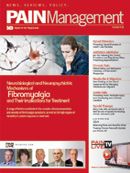Publication
Article
Pain Management
Pain News and Notes: Arthritis Therapies, PDMPs, Cost of Chronic Pain
News on new therapies for osteoarthritis and rheumatoid arthritis, prescription drug monitoring programs, post-operative opioid use, the cost of chronic pain, and other developments in the field of pain management.
News on new therapies for osteoarthritis and rheumatoid arthritis, prescription drug monitoring programs, post-operative opioid use, the cost of chronic pain, and other developments in the field of pain management.
Scientists at the University of Melbourne recently published research in the Annals of the Rheumatic Diseases showing that granulocyte macrophage colony-stimulating factor (GM-CSF) depletion suppresses pain in experimental models of rheumatoid arthritis and osteoarthritis. A news release accompanying publication of the study results notes that previous research has shown that “blocking GM-CSF function with an antibody suppressed the disease leading to clinical trials which are already showing patient benefit.”
Study results published in the Canadian Medical Association Journal show that “real-time access to prescription drug monitoring program databases resulted in a sizable drop in the number of inappropriate prescriptions written for opioids and benzodiazepines in British Columbia,” according to American Medical News. Within 30 months of the program’s installation, “inappropriate prescriptions for opioids and benzodiazepines fell 32.8% and 48.6%, respectively, for those on public assistance. For people 65 and older, there was a 40.1% reduction in inappropriate opioid prescriptions and a 42.4% reduction in inappropriate benzodiazepine prescriptions.”
Study results published in Anesthesia & Analgesia show that “non-pain-related factors—including previous use of pain medications, high perceived risk of addiction, and symptoms of depression—increase the risk of continuing to use strong pain relieving drugs several months after surgery.” The authors reported that long-term postoperative opioid use was higher in patients who took opioids for pain relief prior to surgery, in patients who rated themselves prior to surgery as being at increased risk of becoming addicted, and in patients who presented with symptoms of depression.
Nektar Therapeutics recently announced positive data from “the first single-ascending dose Phase 1a clinical study of NKTR-192,” a mu-opioid agonist molecule designed to have “a short-acting profile and onset of pain relief suitable for the treatment of acute pain, but with a reduced rate of entry into the CNS as compared to other fast-acting opioids used to treat acute pain.” The data show that NKTR-192 “achieved a short-acting pharmacokinetic profile which is ideal for the treatment of acute pain.” Robert Medve, MD, Chief Medical Officer of Nektar Therapeutics, said in a news release that follow-up clinical trials will measure tolerability and “multiple pharmacodynamic endpoints, including indicators of CNS entry and models of analgesia in healthy volunteers” of single ascending doses of NKTR-192.
A study published in the Journal of Pain by health economists from Johns Hopkins University estimates that the total annual cost for pain in the United States is $560-635 billion (incremental costs of pain care are $261-300 billion; the value of lost productivity is $299-334 billion). The authors of the study estimated that 10% of US adults have moderate pain and 11% have severe pain. They also estimated that 33% of adults experience joint pain, 25% have arthritis pain, and 12% have functional disability due to chronic pain. A news release accompanying publication of the study noted that the authors stated that these conclusions are actually conservative estimates, “because the analysis did not consider the costs of pain for institutionalized and non-civilian populations, for persons under 18 and for caregivers.”






